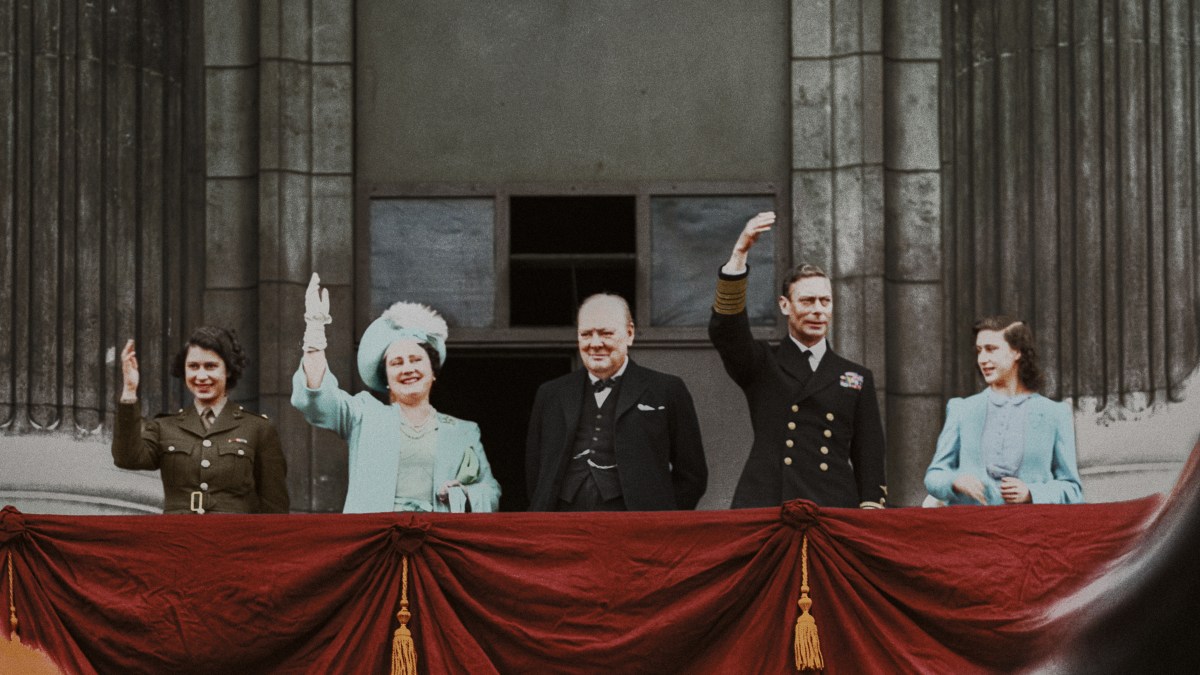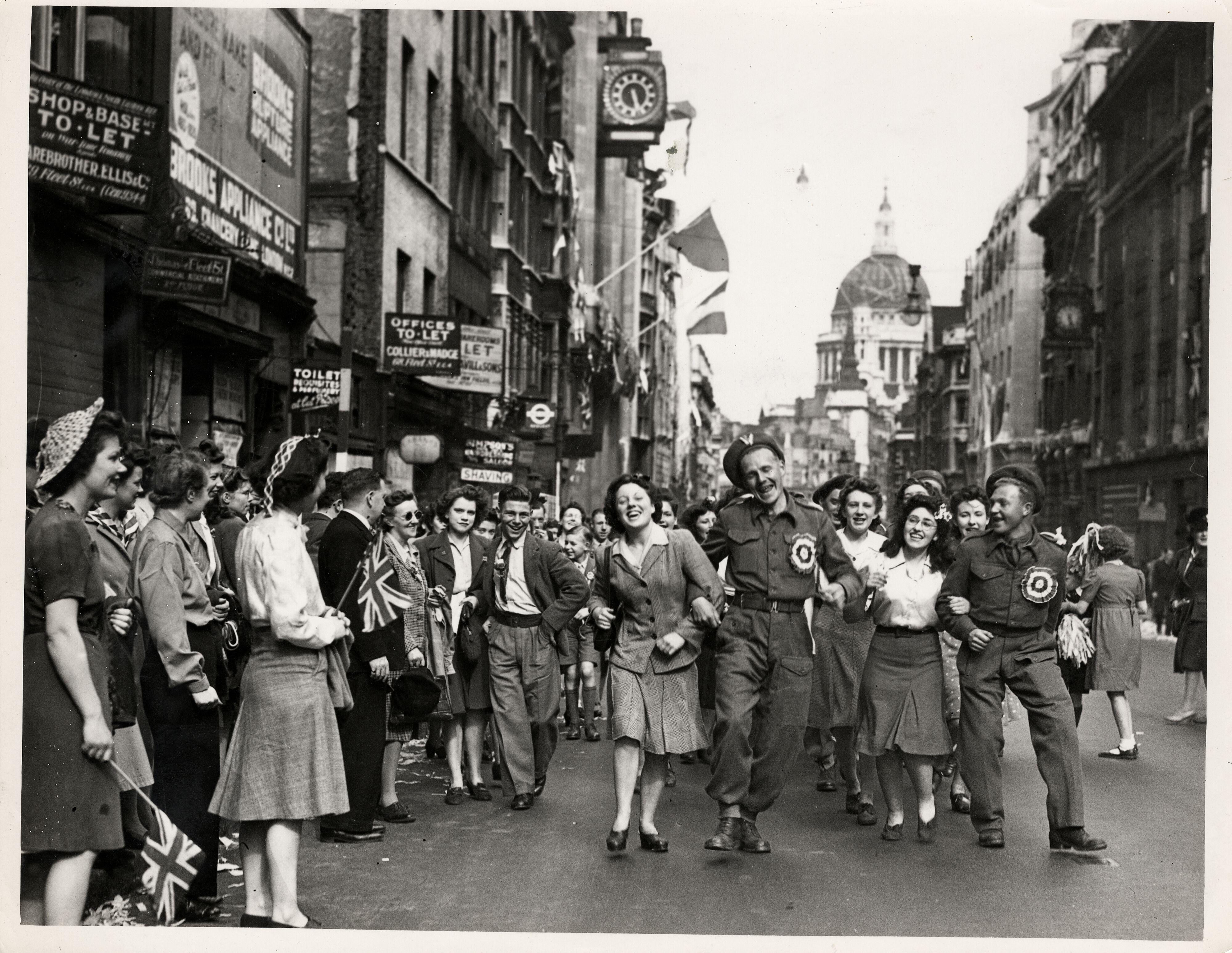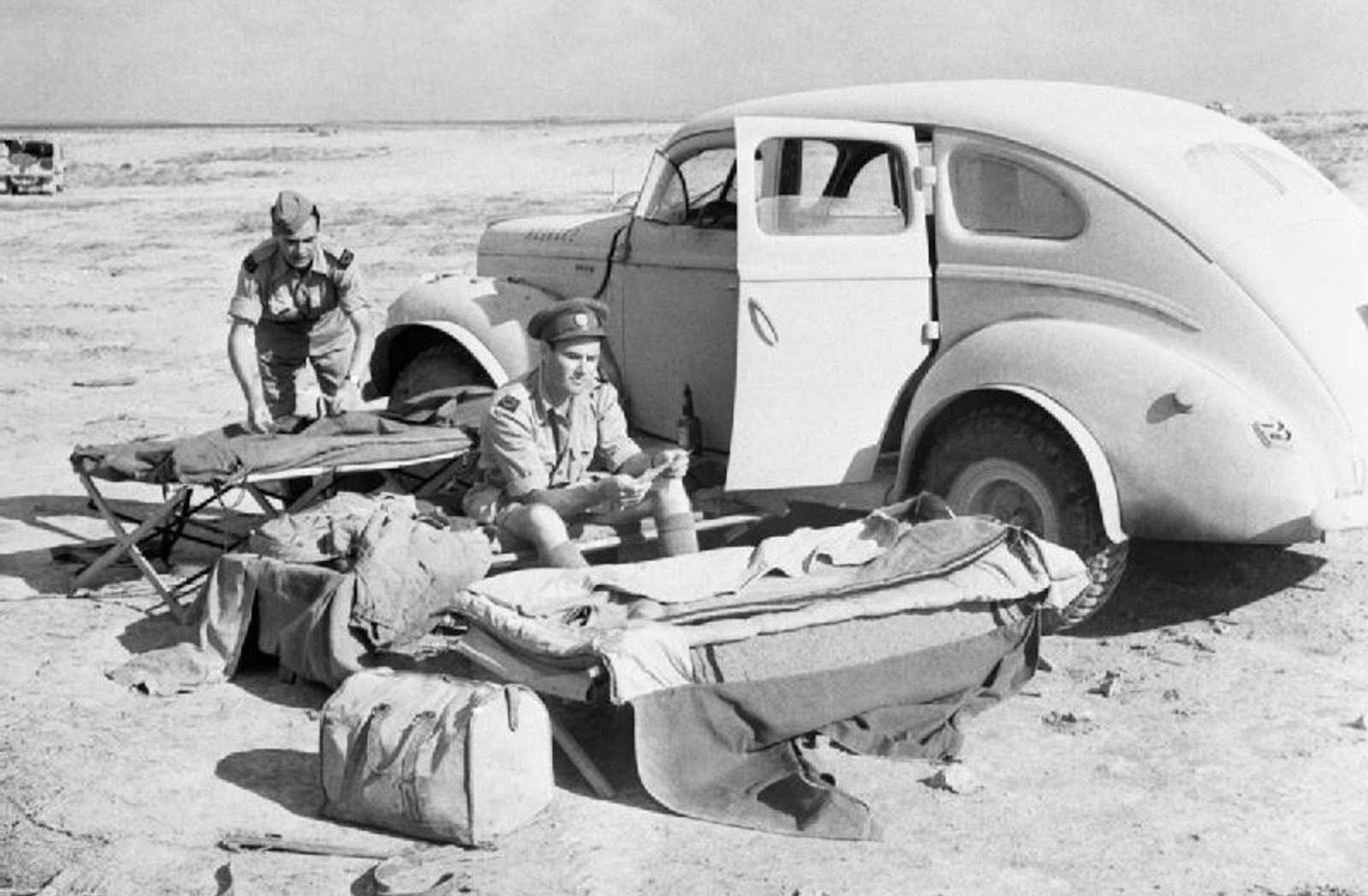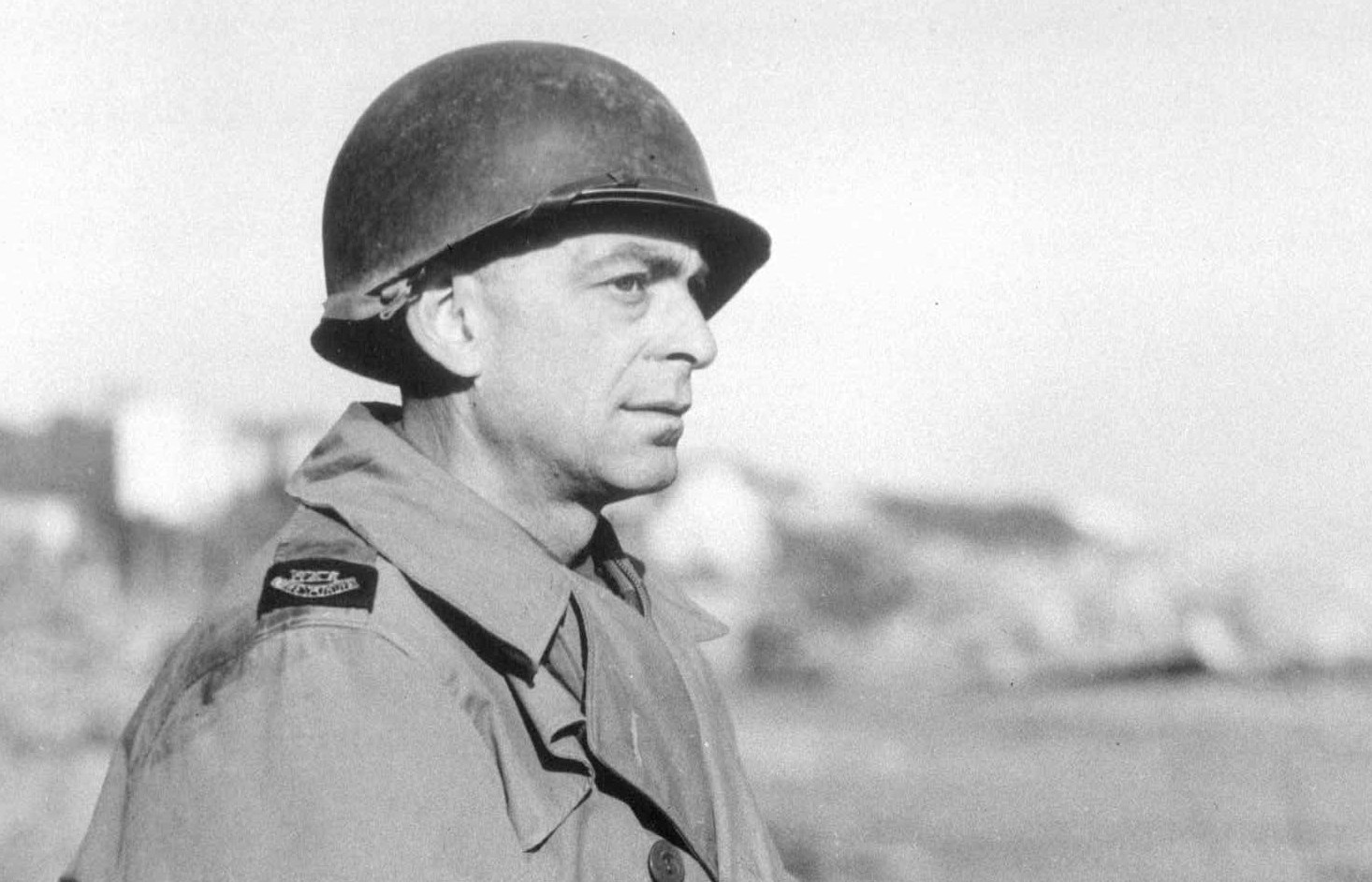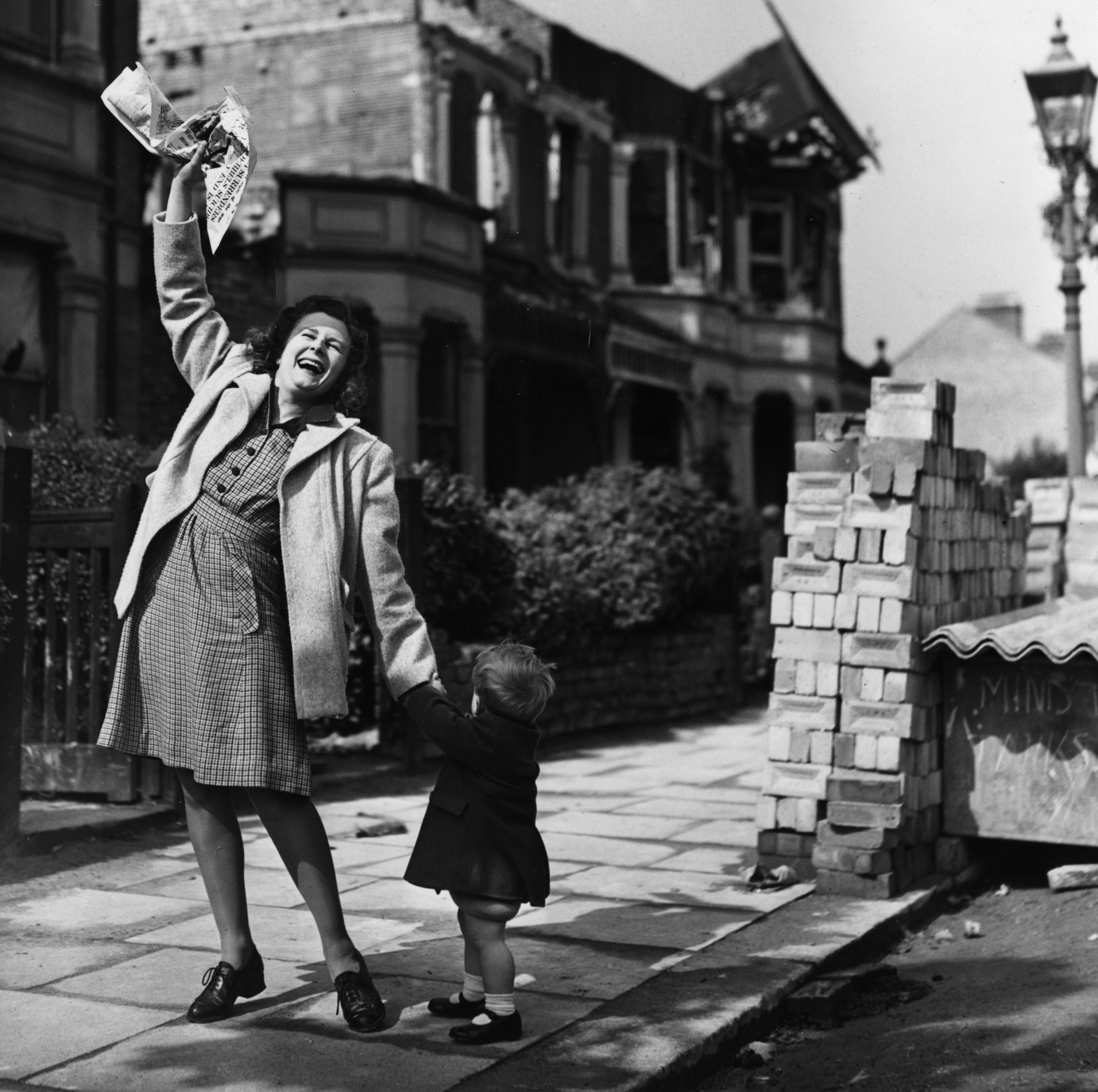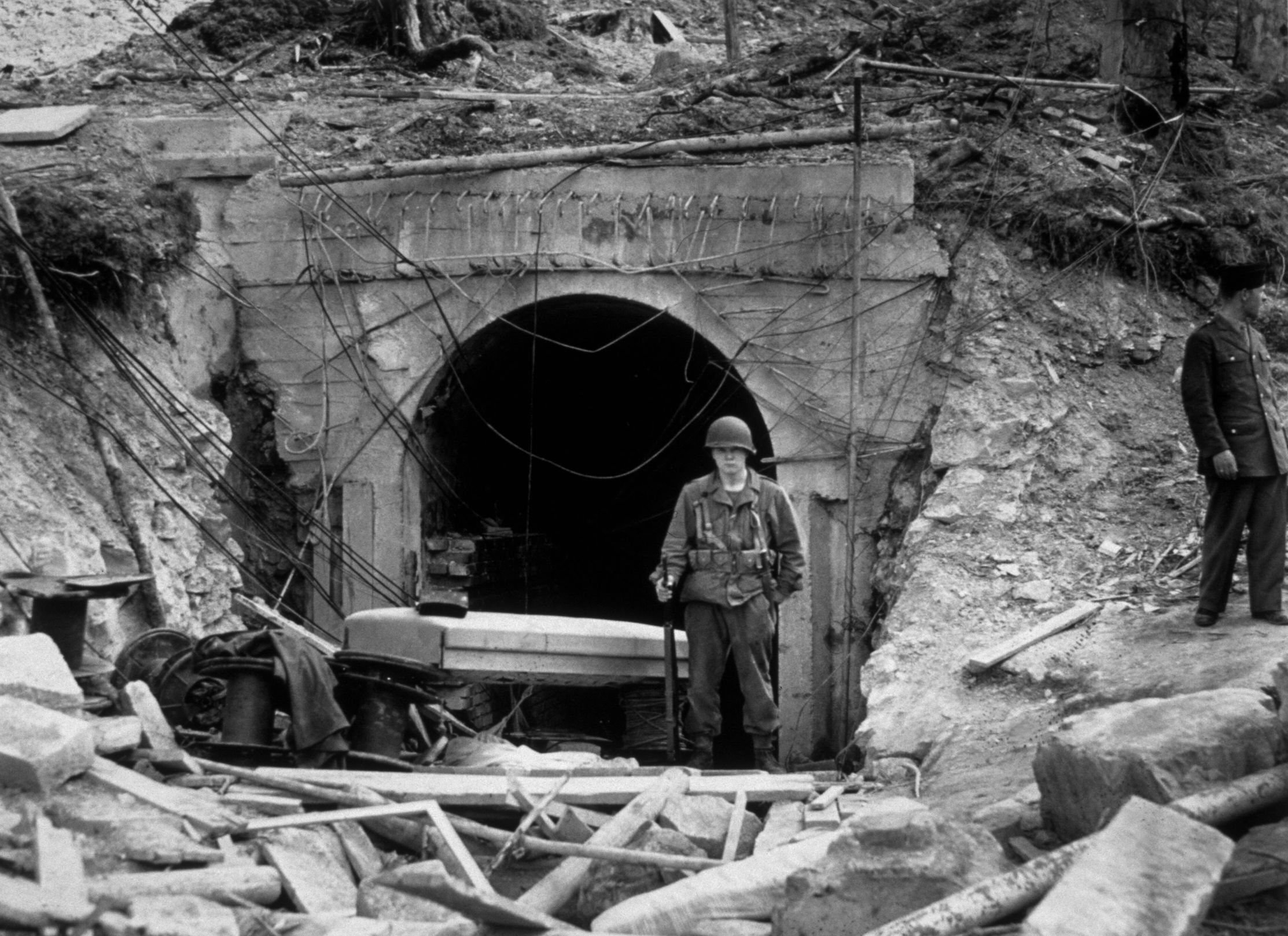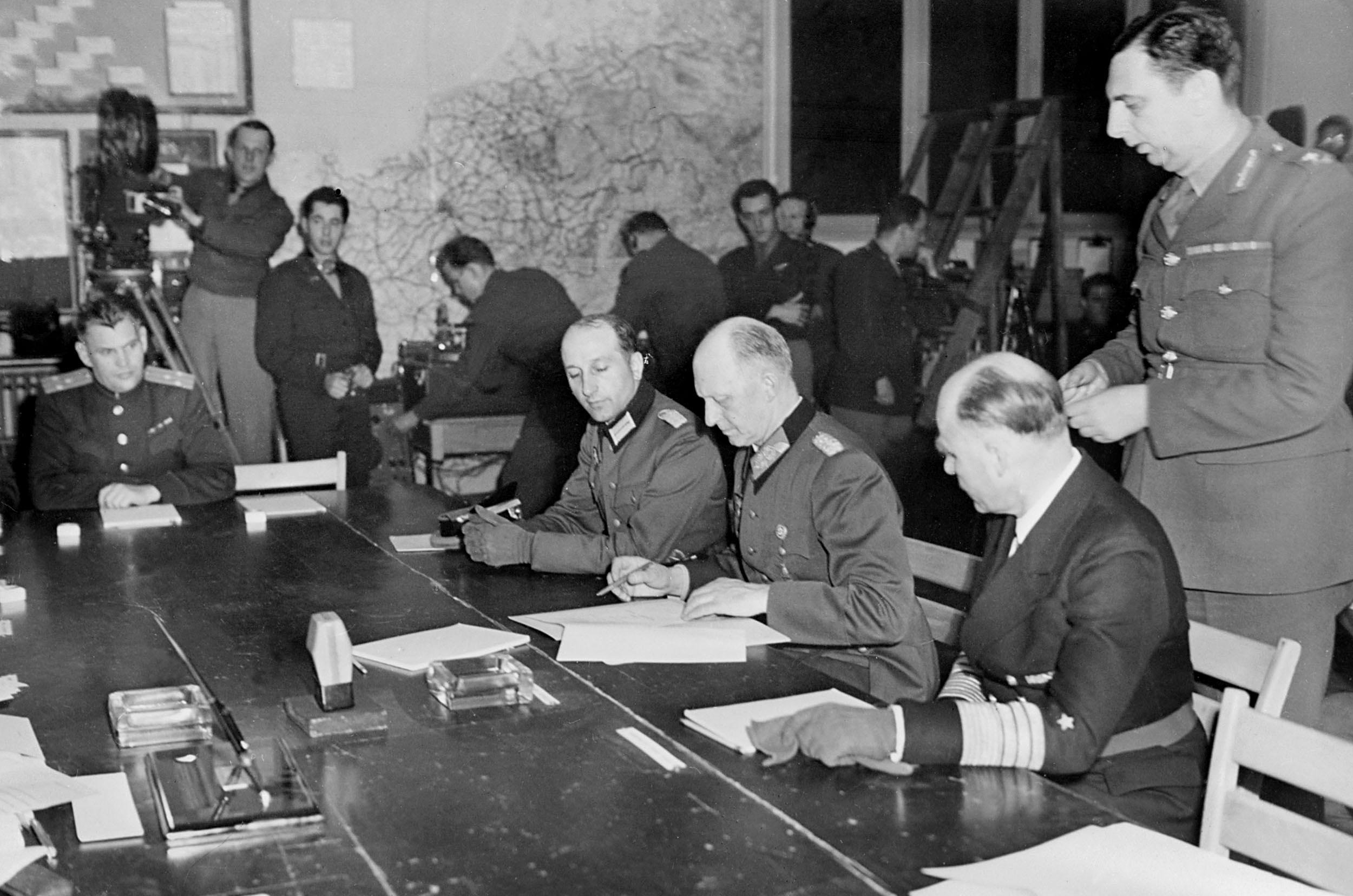With seemingly endless energy, the prime minister is on the move again. He and the war cabinet have now made it through the sea of humanity once more and are now in Whitehall. A further address is expected shortly.
And now we have surely seen the image of the day. In a highly unusual moment, the royal family have emerged once more onto the balcony of Buckingham Palace (they are doing it at a rate of once every 75 minutes), but this time they have been accompanied by a commoner in the form of the prime minister.
As Churchill went to this appointment, he realised that he had forgotten his cigar. Ever aware of his image, he sent a bodyguard back to get one.
The prime minister’s second visit to the Palace today was with his war cabinet, who were received by the King in the Bow Room. The King, Queen and the princesses have made a number of appearances this afternoon and will likely continue to do so as the night wears on.
Our Washington correspondent, Frank Oliver, reports: “Washington is celebrating VE Day quietly. The day has not been declared a public holiday, as in London, and the few flags which are flying are at half-mast for President Roosevelt. President Truman’s broadcast was made at nine o’clock this morning, Immediately afterwards there was a rebroadcast of Mr Churchill’s speech.
“Tonight the dome of the Capitol and the Washington Monument will be illuminated once again, and the “brown-out ” order under which only half the street lamps have been lighted has been revoked.”
In New York there were celebrations, but they were generally restrained. In truth, the people seized upon the breaking of the news there yesterday.
Americans celebrating in Times Square, New York
TONY LINCK/THE LIFE IMAGES COLLECTION/GETTY IMAGES
A soldier is smothered with kisses
UNIVERSAL HISTORY ARCHIVE/GETTY IMAGES
Women wearing dresses representing Allied flags outside the Eglise de la Madeleine in Paris
KEYSTONE/HULTON ARCHIVE/GETTY IMAGES
There is great joy in France, which has been divided by this war. Paris is awash with noise today and will once again become the City of Light this evening.
There have been sirens and salvoes of artillery, as well as a broadcast by General De Gaulle. The only finer day in recent memory was its liberation last August.
Tonight the blackout shall be rescinded and all the famous landmarks of that most romantic of cities will be illuminated once more.
The speaker of the House of Commons leads Winston Churchill and other MPs as they walk to St Margaret’s Church for a thanksgiving service
ALFRED ABRAHAMS/TIMES MEDIA
Members of parliament attracted a great deal of public attention as they have moved across the street in Westminster to St Margaret’s Church. They were led by the Speaker and the Serjeant at Arms. Mr Churchill was accompanied by Arthur Greenwood, the leader of the opposition, and behind them the war cabinet. The crowds cheered and rung bells to celebrate them as they passed.
Inside St Margaret’s, the names of 21 MPs who perished in the war were read. The national anthem and O God, Our Help in Ages Past were sung.
The prime minister has entered the House of Lords, where the Commons has been sitting since its chamber was bombed by the Luftwaffe. He has been greeted tremendously. His parliamentary colleagues stood and waved their order papers. He has repeated his address to the nation but added the following.
“I have only two or three sentences to add. They will convey to the House my deep gratitude to this House of Commons, which has proved itself the strongest foundation for waging war that has ever been seen in the whole of our long history.
“We have all of us made our mistakes, but the strength of the parliamentary institution has been shown to enable it at the same moment to preserve all the title deeds of democracy while waging war in the most stern and protracted form.
“I wish to give my hearty thanks to men of all parties, to everyone in every part of the House where they sit, for the way in which the liveliness of parliamentary institutions has been maintained under the fire of the enemy and for the way in which we have been able to persevere”.
He has now proposed that the House retire to the church of St Margaret’s to give thanks.
One person who is not in Downing Street today is the prime minister’s wife. Clementine Churchill is playing the diplomat today and is in Moscow, though she has been in contact with her husband and has been able to share in the triumph of the day.
In Moscow, Mrs Churchill has expressed admiration for the way the people of the USSR are rebuilding amid the devastation the German invasion brought.
She has also made an appeal for continued Anglo-Soviet friendship after the war: “Unless the friendship that has been established between the Soviet Union and the English-speaking peoples during the war continues, increases and deepens, there will be very little happiness in the immediate future for the world: and by the immediate future I don’t just mean the short span of our lives, but the lives of our children, grandchildren, and great-grandchildren. I hope that, in a small way, my visit will help.”
General Eisenhower with Air Chief Marshal Sir Arthur Tedder of the RAF shortly after the German surrender signing ceremony at Reims
BETTMANN
General Eisenhower has sent a message to the men and women of the Allied Expeditionary Force:
“The crusade on which we embarked in the early summer of 1944 has reached its glorious conclusion. It is my especial privilege, in the name of all nations represented in this theatre of war, to commend each of you for valiant performance of duty. Though these words are feeble they come from the bottom of a heart overflowing with pride in your loyal service and admiration for you as warriors.”
Likewise, Field Marshal Montgomery has issued a message to all ranks under his command.
“It has been a privilege and an honour to command this great British Empire team in western Europe. Few commanders can have had such loyal service as you have given me. I thank each one of you from the bottom of my heart; and so Iet us embark on what lies ahead full of joy and optimism. We have won the German war. Let us now win the peace.”
At the same time as the prime minister’s broadcast, the crowds outside Buckingham Palace shouted: “We want the King! We want the King!”. Their cries have been answered. The royal family have emerged on to the balcony of Buckingham Palace.
This is a family who have by no means been distant from the struggle. Buckingham Palace was bombed by the Luftwaffe and Princess Elizabeth can be seen in her khaki uniform from the Auxiliary Territorial Service.
For the first time since the coronation in 1937, the largest Royal Standard has been raised in celebration.
The prime minister has gone on to summarise the long story of this war, from the invasion of Poland, through the fall of France and the arrival of the Soviet Union and United States to the Allied cause.
He said: “Finally, almost the whole world was combined against the evil-doers who are now prostrate before us. Gratitude to our splendid Allies goes forth from all our hearts.
“We may allow ourselves a brief period of rejoicing, but let us not forget for a moment the toils and efforts that lie ahead. Japan, with all her treachery and greed, remains unsubdued. The injuries she has inflicted upon Great Britain, the United States and other countries, and her detestable cruelties call for justice and retribution.
“We must now devote all our strength and resources to the completion of our tasks both at home and abroad. Long live the cause of freedom! God save the King!”
St Paul’s Cathedral is illuminated to celebrate the end of the war. The survival of Wren’s great cathedral through the long months of the Blitz became a symbol of hope for Londoners
DAILY HERALD/SSPL/GETTY IMAGES
Winston Churchill speaking today from 10 Downing Street
PRINT COLLECTOR/GETTY IMAGES
The prime minister has begun his broadcast from the Cabinet Room, from which his predecessor, Neville Chamberlain, announced the outbreak of war on September 3, 1939.
He said: “Our dear Channel Islands will be free tomorrow. Hostilities will end officially at one minute after midnight tonight, Tuesday, the 8th of May, but in the interests of saving lives the ceasefire began yesterday to be sounded all along the fronts.
“The Germans are still in places resisting the Russian troops, but should they continue to do so after midnight they will, of course, divest themselves of the protection of the laws of war and will be attacked from all quarters by the Allied troops.
“It is not surprising that on such long fronts and in the existing disorder of the enemy the orders of the German high command should not in every case have been obeyed.
“This does not, in our opinion, constitute any reason for withholding from the nation the facts communicated to us by General Eisenhower of the unconditional surrender already signed at Reims, nor should it prevent us from celebrating today and tomorrow, Wednesday, as Victory in Europe Days.”
FRANCIS REISS/PICTURE POST
A wild ride in the streets off Trafalgar Square
BARRATTS
Mr Churchill has made his way back from the Palace before his broadcast at the top of the hour.
The capital he has driven through is already in a state of much excitement and refreshment. At the Chandos pub off Trafalgar Square, they have stopped bothering to wash up glasses in the face of overwhelming and impatient demand for fresh drinks.
In Glasgow, some pubs are already looking at their dwindling stocks with a wary eye. It does not look like everywhere will be able to stay open tonight.
An Indian soldier uses smoke grenades to clear Japanese troops from bunkers in the Maungdaw hills of Burma, 1945.
IMPERIAL WAR MUSEUM
Today is a day of celebration and thanks, but many of our soldiers on the continent already know what is expected of them next: they will be deployed to the Far East to carry on the fight against Japan.
Burma is close to being liberated from Japanese occupation and the enemy is in retreat on all fronts, but they will be able to fall back to their archipelago and continue prosecuting their war from there. Even now, they are drawing out a long battle on Okinawa which has raged for more than a month and there is still no end in sight.
Even against the combined might of the Allies, they could last for a very long time indeed. Today, American planes have launched attacks on the Japanese mainland but an enormous and costly amphibious assault lies in the offing, and many months if not years of fighting are still ahead.
For this newspaper, the war struck extremely close to home: in the early hours of September 25, 1940, our offices at Printing House Square were struck by a Luftwaffe bomb. No one died, and our printing staff had the presses back up and running within 20 minutes. We were not allowed to break our own scoop for 17 days because of rules against reporting bomb damage that would hurt the nation’s morale.
The Times advertising office after the bomb struck, its clock stuck at the moment of detonation
TIMES MEDIA
Throughout the war, The Times has been served by its own Air Raid Precautions service. It still serves us now, but will soon be released. It is hoped that the spirit of comradeship, fortitude, patience and good humour will continue.
Despite the bombing, we did not miss an edition. However, in line with the government’s desire that everyone should have at least a day’s holiday this week, the paper will not be printed on May 10.
The Times office fronting Queen Victoria Street in the City of London was badly damaged in the Blitz
CATHAL O’GORMAN/TIMES NEWSPAPERS LTD
British anti-aircraft gunners celebrate the Lüneburg Heath surrender of May 4, 1945, which covered the Netherlands, Denmark and northern Germany, and preceded the final surrender by three daysTimes Newspapers Ltd, Jordan J. Lloyd / Unseen Histories
HERBERT REGINALD CLOUGH/TIMES MEDIA; COLOURISED BY JORDAN J LLOYD/UNSEEN HISTORIES
War crimes have undeniably been committed, and the scale of the atrocity committed against the Jews and others in the Nazi death camps grows bigger every day. That individuals should be pursued is clear. But what of Germany itself?
A quarter of a century ago, at the end of the Great War, harsh terms were imposed on Germany at Versailles, including crippling reparations, but it soon became apparent that this had been a self-defeating way of securing a peace. Nevertheless, last year the US Treasury secretary proposed such punitive measures, designed to hobble Germany’s agriculture and industry. There is debate out there, but wiser heads should prevail. Among them is Field Marshal Montgomery.
“What are we here for?,” he asked. “To see the Germans get back into their homes, get the crops in and get the coal up before the winter, and to show them how to become good neighbours.”
Cathal O’Gorman, right, at RAF Manston in 1943
ALFRED ABRAHAMS/TIMES MEDIA
Some of the images we see today were taken by the Times photographers Cathal O’Gorman and Eric Greenwood. Both have had long and sometimes bitterly painful wars behind the lens.
Greenwood spent much of last June in Normandy, recording D-Day and the early campaign in France. O’Gorman has spent much of the war attached to the RAF as a photographer.
Eric Greenwood on the Normandy beaches, 1944
JIMMY GEMMELL FOR THE TIMES; COLOURISED BY JORDAN J LLOYD/UNSEEN HISTORIES
However, O’Gorman suffered a tragedy which has befallen many in this war, but it is no less bitter for its frequency. A flying bomb struck his home last year, killing his wife, sister and stepson. O’Gorman was pulled from the debris as a survivor.
Today he is in London, taking pictures of what seems to be unalloyed joy, but he will know the pain many feel today.
The prime minister is surrounded by joyful crowds
THE TIMES/COLOURISATION BY JORDAN J LLOYD/UNSEEN HISTORIES
The prime minister has been invited by the King for lunch at Buckingham Palace. This journey is usually short, but it was a little trickier today.
Mr Churchill was mobbed on his way to this appointment by the enormous crowds of people who have come out to see him and the royal family. He is still understood to be on schedule to broadcast to the nation at 3pm.
Trafalgar Square is in the grip of the greatest celebration it has ever known. The fountains are gushing, people are diving into them and music is being played. Bells can be heard. At Piccadilly Circus there is a bonfire.
Everywhere, civilians and soldiers mingle and dance and drink and sing. There is a conga line at the base of Nelson’s Column.
Hitler’s futile continuation of the war against insurmountable odds has left the nation he led in ruins.
Such has been the waste of German men that women now outnumber them by seven million. In Allied-occupied territories, they are picking up rubble to repair their homes. They are being referred to as Trümmerfrauen, which means “rubble women”.
There will be more than three million German prisoners of war who will need to be monitored and maintained. Food and shelter is scarce.
The management of German PoWs would be a dark chapter in the months after the war. Partly because of their lack of supplies, Supreme Headquarters Allied Expeditionary Force (Shaef) designated the prisoners as “disarmed enemy forces”, which removed their Geneva convention rights. They were detained in open air “Rhine meadow camps” without shelter — some were abused, and those under French control were made to do hard labour. In his book, 1945: Victory in the West, the historian Peter Carrick-Adams suggests that as many as 10,000 died of “disease, malnutrition and neglect”.
American troops remove paintings from Neuschwanstein Castle in southern Germany
BETTMANN/GETTY IMAGES
One of the sideshows in the collapse of the Reich is the discovery of art looted by the Nazis and their allies.
The latest discovery has been made in the Alps between Italy and Austria. The US 85th Division has discovered a hoard in that area which includes Donatello’s St George and Rembrandt’s Old Man. There was also a stash of gold, which has been valued at up to £4 million.
Celebrations in Fleet Street, with St Paul’s in the background
ALAMY
St Paul’s shows no sign of stopping today but has just reached a crescendo with the arrival of the lord mayor and lady mayoress. Now Thank We All Our God is being sung in a service which has all reverence but a minimum of ceremony.
Downing Street has received a telegram from President Truman: “With warm affection, we hail our comrades-in-arms across the Atlantic.”
Churchill has replied: “Your message is cherished by the British nation, and will be regarded as if it were a battle honour by all His Majesty’s Armed Forces, of all the races in all the lands”.
Liberated survivors of what would become known as the Holocaust leave the Mauthausen camp in Upper Austria
FOX PHOTOS/GETTY IMAGES
Despite the untold joy that today will bring, it is impossible to escape the recent discoveries of horror which the Nazis inflicted.
Every day has seemingly brought a new name which will forever be a byword for the worst depths of inhumanity: Auschwitz, Belsen, Dachau.
Even today there are reports from American troops of more such concentration camps, at Falkenau in Czechoslovakia and Mauthausen in Austria. The latter has been found with vast crematoria for the disposal of the murdered. America’s 3rd Cavalry stared in dreadful disbelief at this place and neighbours pleaded their ignorance.
“We were never informed about concentration camps. We were completely surprised and horrified,” a Sergeant Klein said. “What we went through was worse than any battle, injuries, anything else we saw during the war … Our men just broke down crying. Just couldn’t believe what they saw or what they smelt. The worst part of it was that the camp smelt like death.”
Rumours have spread for months that the mountains in the south of Germany were being prepared as a Nazi redoubt, not just with bombproof caves full of supplies, but with factories to maintain the production of materiel. All of this would be defended by elite troops. The fear was this could hold out for years, and this made its way into the press.
Mercifully, in these last months of the war, it became clear that Hitler was insisting on his forces standing their ground and he was not seriously entertaining a tactical withdrawal.
The other supposed threat was Operation Werewolf. This was an attempt to develop a German resistance behind Allied lines as they advanced. That was quelled this week when Grand Admiral Dönitz urged Germans to desist from such operations, saying that it would be to the detriment of the Fatherland.
Bringing a final end to German fighting will take time as various areas hold out.
Among them is the island of Texel, north of Amsterdam. A month ago the Georgian garrison there turned on their German masters, killing 400 of them. A force arrived to suppress this revolt and the island has been gripped by internecine conflict ever since.
On Svalbard, news of the German surrender has been delivered to a weather station. The Germans running this station have subsequently lost radio contact and are essentially stranded. They have plenty of food and are continuing to broadcast weather reports.
It will be some time before the weather station is noticed broadcasting on Allied distress channels. When a Norwegian ship arrived to rescue him, Lieutenant Wilhelm Dege handed over his pistol. He became the last Nazi soldier to surrender, on September 4, 119 days after VE Day.
Grand Admiral Dönitz’s order is not preventing some unnecessary tragedy. There has been a U-boat attack off the coast of North Berwick, sinking two merchant navy ships. The dead are seven of the 29 crew on Sneland I, a Norwegian cargo ship, and two of the 38 crew on Avondale Park, a Canadian ship.
Our Royal Navy will continue on operations on the coast until they are certain that the U-boat threat is over. Servicemen are still dying in these hours between the signing of the surrender and its coming into effect.
Thirty-one soldiers died in Germany and the Netherlands on May 7 and 8.
Grand Admiral Karl Dönitz, in his capacity as the supposed new leader of the German Reich, has issued an order to U-boats to cease hostilities and return home. This order was given on May 4, but it has not necessarily been followed. There are numerous U-boats at large in the Atlantic and elsewhere. It is unclear what their missions are or where they are heading.
One U-Boat in the Atlantic was carrying scientists and uranium to Japan in an attempt to help their atomic project. It would be apprehended by the Americans.
Two others were to flee upon hearing of the surrender and end up in Argentina. Although they were also turned over to the Americans, their escape started rumours of mass Nazi flight to South America.
Nazis on the march on Guernsey, 1940
EXPRESS/GETTY IMAGES
The people of the Channel Islands have received word of their liberation. Tomorrow will be their liberation day, ending five years of occupation by the Germans. Thousands fled the islands before the invasion began, but many stayed and have been subjected to Nazi oppression ever since.
They have suffered food shortages and seen their beautiful island homes carved up by Nazi fortifications and camps.
SCHIRNER/ULLSTEIN BILD/GETTY IMAGES
Germany’s surrender has been brought about by an unlikely group of people with an unlikely leader.
It was a tremendous surprise on May 1 when the German naval commander Karl Dönitz announced the death of Hitler and his own succession to power. His legitimacy is unclear and Allied powers have not recognised his government, which is now based in the northern coastal town of Flensburg.
Until his sudden elevation, Dönitz was the commander of the German navy and he prosecuted the war in the Atlantic in a most brutal manner.
While not apparently a politician, Dönitz was loyal to Hitler. That he has assembled a government featuring almost none of the senior Nazis from Hitler’s regime speaks to the chaos engulfing their movement.
Dönitz is an English speaker. In the last war, he was captured in a U-boat off the coast of Malta and was subsequently put in a prison camp near Sheffield.
Alan Moorehead and Alexander Clifford on assignment in north Africa earlier in the war
ALAMY
Yesterday brought the capitulation of 300,000 troops in Norway, but it started in the most bizarre fashion.
The war correspondents Alan Moorehead and Alexander Clifford began the day in Denmark before deciding to see what was happening in Norway, the last western power to be occupied. With some photographers they found two pilots and asked for a lift to Oslo.
They had no idea whether a surrender had taken place or if Allied troops were ahead of them, and there was a good chance that they would get shot down. At Oslo, a warning light told them not to land but they proceeded regardless.
When they landed they were approached by a German colonel who informed Clifford that an Allied commission was expected and the capitulation would not take place until midnight. He threatened them with arrest, but Clifford insisted that he should surrender. In the end, the colonel agreed and gave the men cars. They went to the Grand Hotel.
Ed Kennedy in north Africa, 1944
AP
News of the surrender was not meant to break yesterday, but a German radio broadcast let the truth out and helped to save lives. The 17 journalists who had been in the room where the surrender was signed were still under embargo.
When Ed Kennedy of the Associated Press heard of the broadcast he realised that the reason for the embargo was political rather than for security reasons. He decided to break the news on the AP wire.
Eisenhower has revoked Kennedy’s accreditation and suspended AP service in Europe. Opinion on Kennedy’s actions among the press corps is mixed.
“The absurdity of attempting to bottle up news of such magnitude was too apparent,” Kennedy said. “I knew from experience that one might as well as try to censor the rising sun.”
Ed Kennedy would be fired by AP that September. In May 2012, 49 years after his death, AP apologised. “It was a terrible day for the AP. It was handled in the worst possible way,” said Tom Curley, the chief executive. “Once the war is over, you can’t hold back information like that. The world needed to know”.
“The unconditional surrender has been achieved by teamwork; teamwork not only among all the Allies participating but almost all the services–land, sea, and air. To every subordinate that has been in this command of almost 5,000,000 allies, I owe a debt of gratitude that can never be repaid. The only repayment that can be made to them is the deep appreciation and lasting gratitude of all free citizens of all the United Nations.”
Newspapers were not allowed into the training college in Reims, where General Eisenhower has his headquarters, but the reports of broadcasters paint a vivid picture. The lights for their cameras added a fierce heat to the proceedings in Eisenhower’s map-lined war room.
Accompanied by their assistants, General Jodl and Admiral Friedeburg of Germany entered and sat in two chairs on one side of a long table. Across from them were 12 places filled by representatives of the Allied powers. General Bedell Smith, Eisenhower’s chief of staff, oversaw proceedings.
Once the signing was complete, Jodl asked if he could speak.
Sounding close to sobbing, he said: “With this signature the German people and the German armed forces are, for better or worse, delivered into the victor’s hands. In this hour, I can only express the hope that the victor will treat them with generosity.”’
St Paul’s Cathedral, that symbol of defiance during the Blitz, is leading the nation in thanksgiving and has just begun a day of informal services. These shall happen throughout the day and huge crowds have already gathered around the place known as the parish church of the Empire.
Hymns are being sung with great fervour, and the public are flooding the steps of the cathedral to be part of this unique and memorable day.
Around the City, by the Royal Exchange and Mansion House, there are banners and flags of the dominions. Some of them stretch from one side of the street to the other. Our correspondent says that it has lent this old English city an “almost oriental exuberance of decoration”.
Many would not have dared to imagine this a week ago. Axis forces in Italy had surrendered and victory was assured, but Germany was still grimly hanging on and there were fears that the Nazi regime may have a strategy which would allow them to hold out for months or more.
Adolf Hitler and his aide Julius Schaub in the ruins of the Reich chancellery last month, in what is allegedly the last photograph of the Führer
ULLSTEID BILD/GETTY IMAGES
Then news broke of Hitler’s death and there soon followed surrenders in Berlin, the Netherlands, Denmark, parts of northern Germany, Bavaria and more. The Nazi capitulation happened slowly then suddenly.
As for Hitler, we were told he died a “hero’s death in the capital of the German Reich” but no trace of him has been found and his cabinet has disintegrated, either having fled, vanished or taken their own lives.
The reality of Hitler’s suicide and the burning of his body would not be uncovered by British Intelligence until November 1, 1945
Londoners await the proclamation of victory in Piccadilly
SIDNEY BEADELL FOR THE TIMES; COLOURISED BY JORDAN J LLOYD AND JOSHUA BARRETT/UNSEEN HISTORIES
Pat Burgess of Palmers Green, north London, received news yesterday that her husband would soon be home from Germany for good
REG SPELLER/FOX PHOTOS/GETTY IMAGES
Ships from Southampton Docks to the Clyde sounded their horns in celebration. V for victory was signalled by searchlights.
The weather, however, did not play ball last night. With the skies over London finally safe of German bombers, there did come a tremendous thunderstor. For many, the mood was already rather damp as for them this day brings more trepidation than joy. Many fear that the end of the war will mean the end of their employment.
Evacuated children are writing excited letters home. In cities across the country, the children who stayed at home are celebrating in rubble.
French troops at Berchtesgaden have taken a tank and used it to blow open the steel doors off Hitler’s wine cellar which, for a reported teetotaller, was well stocked.
Sergent-chef Bernard de Nonancourt, who is part of the Lanson champagne house, was ordered to save the wine before the Americans got it. “I saw every great wine I had ever heard of, every legendary vintage. All that had been made by the Rothschilds was there, the Lafites, the Moutons. As well as rare ports and cognacs dating from the nineteenth century, there were outstanding Burgundies, while the Bordeaux were just extraordinary. There were 500,000 bottles, many of them magnums.”
Allied troops have raced to Berchtesgaden this week to drink from one of Europe’s biggest wine cellars
US NATIONAL ARCHIVES
Nonancourt is using every vehicle at his disposal to liberate the wine, even ambulances.
Sergent-chef Bernard de Nonancourt would be awarded the Croix-de-Guerre for “service in action to French wine”.
In Germany, the Nazi regime lies in ruins. There is no greater symbol of its defeat than the Allied soldiers and western journalists who are now getting a good look at Adolf Hitler’s former lair of Berchtesgaden.
The “Eagle’s Nest” appears to have been constructed as a fortress above a great labyrinth carved into the mountains, making it all the more curious that Hitler did not retreat there but instead chose to remain in Berlin.
The residence, bombed by the RAF, is now a smouldering ruin, but the catacombs stretch for miles. There are kitchens, bedrooms, living rooms, pantries, all lit by electricity and serviced with air-conditioning and telephone lines.
Hitler was not short of self-regard. His library of recordings contained fine music but also his own speeches. There are yards and yards of film, some of them speeches at the large Nazi conferences. More chillingly, there is footage of the execution of his opponents.
If Churchill had had his way, this party might have started earlier.
As talk of a German surrender built yesterday afternoon, efforts were made to hasten the planned joint announcement which was scheduled for today. The PM requested this of President Truman by telegram.
A few minutes before 6pm, Churchill was primed and ready to broadcast on the BBC but, at the last minute, Washington told Churchill that Stalin would not budge. The prime minister told his cabinet that he had cancelled to “save the snarl from Uncle Joe”.
Instead, a pre-announcement was made which confirmed that today would be a public holiday, thus making it clear that peace had arrived. Today therefore is VE Day, though the BBC are keen on the less triumphalist Ceasefire Day.
Nevertheless, Uncle Joe did snarl. He has minor complaints about the text and is insistent that the official surrender be signed in (Russian-occupied) Berlin.
At least a few young women and sailors appear to have spent the night in Trafalgar Square
JOHN HEDDON/MIRRORPIX
One witness to last night’s festivities in Trafalgar Square said: “An astonishing sight was vaguely visible in the darkness. The whole square was filled with people. One could just see groups of men and women, their arms linked together, whirling round and round. Others leapt about on their own in their irrepressible relief and joy … An enormous tide, or river, of humanity filled the square in ever-increasing numbers, as others heard the news and flocked in from neighbouring streets.”
Journalists, all in the line of duty, also got involved. The Daily Mirror’s man in Piccadilly Circus reported: “This is IT — and we are all going nuts! There are thousands of us in Piccadilly Circus. The police say more than 10,000—and that’s a conservative estimate.”
They danced the conga and sang Knees Up Mother Brown.
General Alfred Jodl signs Germany’s unconditional surrender at Allied headquarters in Reims
AFP
The act which brought the war to an end took place in Reims at 2.41am yesterday.
After days of back and forth and partial capitulation across the continent, German commanders accepted the inevitable and signed an instrument of surrender. Their hope had been to surrender only to the western Allies, but General Eisenhower insisted that surrender must be total.
The cars arrived at the Supreme Headquarters of the Allied Expeditionary Force (Shaef) at Reims in the early hours. In a final mark of disdain for the Nazi representatives, Eisenhower refused to greet them but sent his chief of staff, General Bedell Smith, to sign the instrument on his behalf.
The Russian Major General Ivan Susloparov also signed, so it is clear the Soviets will accept these terms. They have still insisted on a separate signing in Berlin later today.
Today is Victory in Europe Day. After a night of wild celebration across the country and the continent, today will bring a series of events formalising the end of hostilities in Europe after almost six years of total war.
The prime minister, Winston Churchill, will deliver a broadcast to the nation at 3pm, at which point he will declare when the war will officially end. The King will speak to the Commonwealth and Empire this evening.
There will be services of thanksgiving and, undoubtedly, more festivities on this public holiday. Crowds are still thronging in London and elsewhere. We are told that the prime minister has made enquiries with the Ministry of Food to ensure that the capital has enough beer to last the day.
